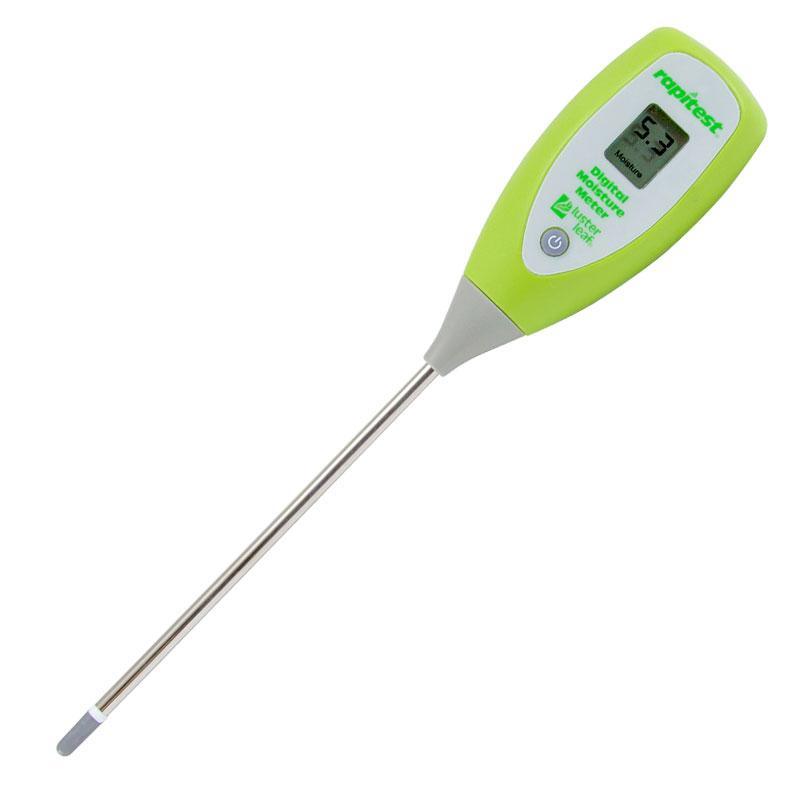The Ultimate Overview to Wetness Meters: A Comprehensive Review and Exactly How They Can Conserve You Money
Moisture meters offer as crucial devices in finding and keeping an eye on moisture material in materials, assisting in preventing expensive problems and ensuring the high quality of products. Understanding the nuances of different kinds of dampness meters, their applications, and the potential cost-saving benefits they offer can be a game-changer for professionals and companies alike.
Kinds Of Dampness Meters
Numerous sorts of dampness meters are available for different applications in different industries. One usual kind is the pin-type wetness meter, which determines the electric resistance between two pins put right into a product. This type appropriates for wood, drywall, and other building materials. Pinless wetness meters, on the other hand, use electromagnetic sensor plates to scan a larger location without creating damage to the material's surface. Moisture Meter. These meters are excellent for promptly evaluating wetness levels in huge locations such as walls and floors.

Moreover, there are additionally specialized dampness meters created for specific products like grain, soil, or hay. These meters offer precise dampness analyses tailored to the distinct residential or commercial properties of the material being examined. Infrared dampness meters measure the thermal buildings of a product to determine its dampness material non-invasively, making them beneficial for applications where pin or pinless meters might not be appropriate. Understanding the various sorts of wetness meters readily available can aid industries select the most suitable device for their specific wetness dimension requirements.

Benefits of Making Use Of Wetness Meters
Dampness meters provide important benefits in accurately examining and monitoring wetness degrees in diverse materials and environments (Moisture Meter). Among the main benefits of using moisture meters is the prevention of prospective damages caused by excess wetness. By detecting and attending to high wetness levels at an early stage, wetness meters assist to stop mold and mildew growth, rot, and architectural damage in buildings, saving both money and time on repairs. Furthermore, dampness meters help in making sure the high quality of products during building and construction or manufacturing processes. By accurately gauging wetness material, these tools help preserve the stability of wood, drywall, concrete, and other materials, minimizing the danger of failings or flaws.
Furthermore, using dampness meters can lead to boosted power performance. In farming settings, moisture meters play an essential role in enhancing plant returns by enabling farmers to check soil wetness degrees and make informed watering choices.
Exactly How to Pick the Right Moisture Meter
Selecting the ideal moisture meter includes thinking about essential factors such as product compatibility, measurement variety, and calibration accuracy. When choosing a wetness meter, it's important to make sure that the meter appropriates for the specific product you will certainly be testing. Various products have differing electric buildings that can influence dampness readings, so selecting a meter made for your product is important for accurate outcomes. In addition, think about the measurement range of the wetness meter. Guarantee that the meter can detect wetness degrees within the range needed for your applications. Calibration precision is an additional critical element to remember. Choose a wetness meter with trustworthy calibration to ensure exact and constant readings. Some meters may need routine calibration adjustments, so comprehending the calibration process is crucial. By thoroughly assessing these aspects, you can select a wetness meter that satisfies your requirements and provides precise moisture measurements for your jobs.
Appropriate Methods for Dampness Meter Usage

Expense Financial Savings Through Moisture Meter Applications
Exactly how can the discover here tactical application of moisture meters lead to substantial expense savings throughout various markets? In the farming industry, dampness meters help in figuring out the optimal time for gathering crops, avoiding over-drying or excess dampness that can affect the last product's top quality.
In a similar way, in building and construction, moisture meters assist avoid expensive damages by discovering dampness levels in structure products, such as wood or concrete, which can bring about architectural problems otherwise resolved immediately. By identifying issue locations early, service providers can take corrective actions to prevent extensive repair services or replacements, inevitably saving money and time.
Additionally, in the food processing industry, dampness meters are necessary for keeping an eye on item quality and guaranteeing compliance with security policies. By accurately determining moisture web content in food products, manufacturers can prevent putridity, preserve quality, and reduce waste, causing substantial price savings. Overall, the critical application of moisture meters is an important investment that can cause significant cost reductions and boosted efficiency across numerous sectors.
Verdict
To conclude, wetness meters are beneficial tools for determining and spotting dampness levels in various products. By making use of the appropriate moisture meter and complying with appropriate techniques, customers can efficiently prevent pricey damages triggered by excess moisture. Buying a top quality moisture meter can result in significant price financial savings in the future by recognizing possible concerns early on and enabling prompt removal. Eventually, wetness site link meters are vital instruments for keeping the honesty and durability of products and structures.
Wetness meters offer as vital tools in finding and keeping track of moisture content in materials, aiding in stopping costly damages and ensuring the quality of items. Infrared dampness meters measure the thermal homes of a material to establish its dampness web content non-invasively, making them beneficial for applications where pin or pinless meters might not be suitable.Moisture meters use invaluable benefits in precisely evaluating and keeping an eye on dampness degrees in varied products and atmospheres. In agricultural settings, moisture meters navigate to this website play an important duty in enhancing crop yields by enabling farmers to monitor soil wetness degrees and make informed watering decisions.In verdict, dampness meters are beneficial tools for measuring and spotting moisture degrees in various products.
Comments on “Moisture Meter Reviews: Contrasting the Best Models for Expert and DIY Use”